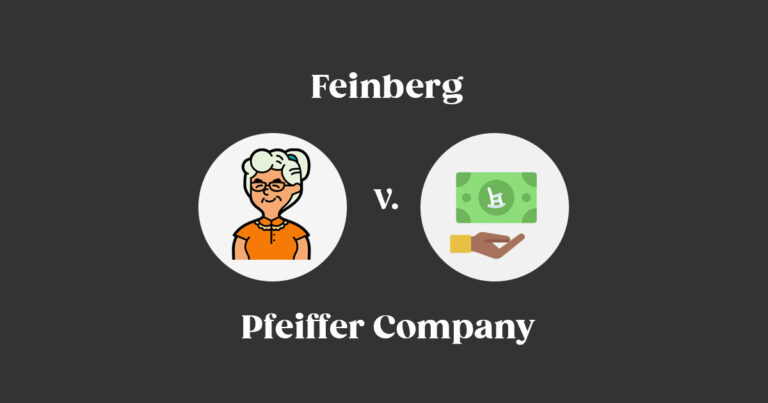Quick Summary
Anna Feinberg has been at Pfeiffer company for 40 years. A few years before she retired, the company’s president raised her salary and gave her 50% of it as a pension. After her retirement, the president died, and his son-in-law took over. He deemed her pension an unnecessary expense and reduced the amount. Anna declined the injustice & sued.
At trial, the defendant claimed that the agreement is gratuitous and they wish to terminate it.
The court ruled that the defendant was responsible for paying the complete sum that was promised because the plaintiff made the decision to retire based on the expectation of receiving her pension funds.
Rule of Law
The principle of mutual obligation, where a commitment is negotiated and provided in exchange for a promise, must be considered.
Facts of the Case
Anna Feinberg started working for the Pfeiffer Company in 1910 when she was just 17 years old. By 1947, she’d become a bookkeeper, office manager, and assistant treasurer, earning $350 a month. That year, the company’s board of directors voted to increase her salary to $400 a month and to award her a pension of $200 a month for life, beginning whenever she chose to retire.
They gave her these large bonuses to thank Feinberg for her years of service to the company. Feinberg retired in 1949. The company president began paying her $200 a month. When the president died, his widow continued the payments. But in 1953, the president’s son-in-law took over the company.
He declared that the payments to Feinberg were an unnecessary gift, creating no contractual obligation, and they reduced it to $100 a month. Feinberg declined to accept the reduced amount and brought suit to enforce the former Pfeiffer president’s promise. The court awarded Feinberg the amount she would have received by that point, plus interest. The trial court ruled for Feinberg and awarded damages. Pfeiffer appealed.
Issue
Whether the defendant is accountable for paying the full amount of the plaintiff’s pension.
Holding and Conclusion
Yes.
The court determined that the principle of promissory estoppel applied, as the plaintiff relied on the promise and took action, which was foreseeable by the defendant, based on the promise.
The defendant made a promise to the plaintiff about the defined benefit and the plaintiff relied on that promise as she was too old to work and had cancer. The court enforced the promise, stating that the trust was reasonable, and the defendant should be held accountable for the payment of the full amount promised.
Reasoning and Analysis
The court reasoned that the promissory estoppel applies to this situation because the plaintiff relied on the promise and took action, which was reasonably foreseeable by the defendant, based on the promise. Therefore, she could not get a job anywhere else.
In this case, the court decided that this trust was reasonable, and like the lower court, it enforced the promise. To prove the exception for detrimental reliance, there must be a promise. In this case, the defendant made a promise to the plaintiff about the defined benefit. Then, the plaintiff must have relied on the promise because she was too old to work and had cancer, so she couldn’t get a job to make money for herself.
Relevant FAQs of this case
Can a company deny a pension promise if it was made years ago?
Yes, a company can deny a pension promise if it was made years ago, but this will depend on various factors, such as the language used in the promise, the laws and regulations of the jurisdiction, and the circumstances surrounding the promise.
For example, in the United States, if a pension promise is made through an ERISA-regulated plan, it may only be amended or terminated in limited circumstances and with proper notice to plan participants.
How does the principle of promissory estoppel affect the enforceability of pension promises?
Promissory estoppel can impact the enforceability of pension promises if the employee relies on the promise of a pension and makes decisions, such as leaving other employment or declining other retirement benefits, based on that promise.
For example, suppose a company promised an employee a certain pension benefit, and the employee relied on that promise by retiring. In that case, promissory estoppel could prevent the company from denying the promised benefit.
What happens if a company fails to fulfill its pension promises to employees?
If a company fails to fulfill its pension promises to employees, it may result in legal consequences. For example, in the United States, employees can bring a lawsuit against the company for breach of contract or violation of federal pension laws, such as the Employee Retirement Income Security Act (ERISA).
An example of this is the case of Lockheed Corp. v. Spink, where the company was found to have breached its pension promises and was ordered to pay damages to affected employees.
References
Was this case brief helpful?
